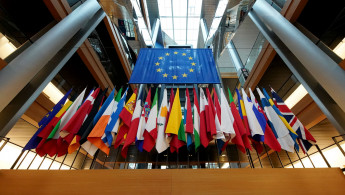EU says 'committed' to negotiated two-state MidEast peace following Trump's unveiling of contested plan
High representative Josep Borrell was speaking after President Donald Trump unveiled a "last opportunity" for the Palestinians to sign up to a controversial plan drawn up by US officials.
"The European Union will study and assess the proposals put forward," Borrell said.
But he added: "This will be done on the basis of the EU's established position and its firm and united commitment to a negotiated and viable two-state solution that takes into account the legitimate aspirations of both the Palestinians and the Israelis, respecting all relevant UN resolutions and internationally agreed parameters."
Borrell acknowledged that: "Today's initiative by the United States provides an occasion to re-launch the urgently needed efforts towards a negotiated and viable solution to the Israeli-Palestinian conflict."
But he made it clear that European capitals see the need for more inclusive negotiation ahead.
"The EU reaffirms its readiness to work towards the resumption of meaningful negotiations to resolve all permanent status issues and to achieve a just and lasting peace," he said.
Read more: 'Deal of the Century': Palestinians feel letdown but can they resist American and Israeli dictation?
"It urges both sides to demonstrate, through policies and actions, a genuine commitment to the two-state solution as the only realistic way to end the conflict."
The statement did not say whether or not he had consulted some or all EU members before issuing his reaction, but most capitals have previously expressed support for a negotiated solution.
Twitter Post
|
US President Donald Trump’s so-called "Deal of the Century" Israel-Palestine peace plan has been exposed to be highly favourable to Israel, analysts said, just moments after the controversial document was revealed in Washington.
Conceptual maps included in the long-awaited peace plan, designed to resolve the Israel-Palestine conflict, expose Israel’s mass annexation of Palestinian land while giving the Palestinians limited sovereignty over an alleged “future Palestinian state”.
Meanwhile, Israel is due to remain in control of a unified Jerusalem as its capital, contrary to the demands of the Palestinians.
Trump’s plan also spares Israel’s controversial and illegal settlements in the occupied West Bank, which will remain in place. Around 200,000 Israeli Jews now live in east Jerusalem in settlement homes considered illegal under international law.
The Palestinians have already rejected the proposal, accusing Trump of being biased in favour of Israel as he has adopted policies that bolster Israel at their expense.
Trump, releasing the plan before a strongly pro-Israel audience at the White House with Israeli Prime Minister Benjamin Netanyahu by his side, acknowledged that he has done a lot for Israel, but he said he wanted the deal to be a “great deal for the Palestinians.” Trump said the deal is a "historic opportunity" for Palestinians to achieve an independent state of their own.
The 50-page political outline goes further in concessions to the Palestinians than many analysts had believed was likely. However, it would require them to accept conditions they have been previously unwilling to consider, such as accepting West Bank settlements. It builds on a 30-page economic plan for the West Bank and Gaza that was unveiled last June and which the Palestinians have also rejected,
Under the terms of the “peace vision" that Trump's son-in-law and senior adviser Jared Kushner has been working on for nearly three years, the future Palestinian state would consist of the West Bank and Gaza, connected by a combination of above-ground roads and tunnels.
Netanyahu and his main political challenger in March elections, Benny Gantz, had signed off on the plan.





 Follow the Middle East's top stories in English at The New Arab on Google News
Follow the Middle East's top stories in English at The New Arab on Google News
![The UAE is widely suspected of arming the RSF militia [Getty]](/sites/default/files/styles/image_330x185/public/2024-11/GettyImages-472529908.jpg?h=69f2b9d0&itok=Yauw3YTG)
![Netanyahu furiously denounced the ICC [Getty]](/sites/default/files/styles/image_330x185/public/2024-11/GettyImages-2169352575.jpg?h=199d8c1f&itok=-vRiruf5)
![Both Hamas and the Palestinian Authority welcomed the ICC arrest warrants [Getty]](/sites/default/files/styles/image_330x185/public/2024-11/GettyImages-2178351173.jpg?h=199d8c1f&itok=TV858iVg)